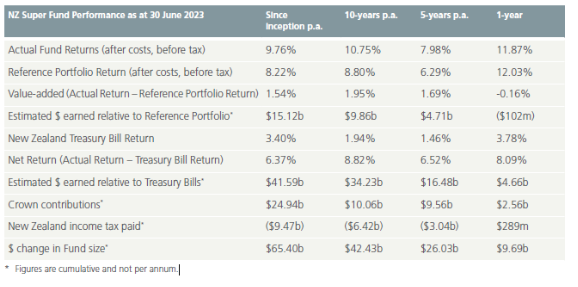
NZ Super Fund says a strong performance by global share markets during the first half of this year has underpinned an "excellent" full-year result for the fund, which returned 11.9% after costs and before NZ tax.
The fund, set up to help with NZ's future pension commitments, increased in value in the year to June 30 by $9.7 billion to $65.4 billion, a record high for the year end.
The fund said that the global recovery in share prices over the year meant that the Super Fund’s total return slightly lagged that of its Reference Portfolio benchmark, which generated 12%. However, the Fund exceeded its Treasury Bill return benchmark, a measure of the cost to the Government of paying into the Fund, by 8.1% or $4.7 billion.
This was a marked contrast to last year’s result, when a collapse in global bond and equity markets saw the Reference Portfolio lose 14.2%, "and a strong performance by the Super Fund’s active investment strategies saw the Super Fund significantly outperform its benchmark".
Matt Whineray, CEO of the Guardians of New Zealand Superannuation, which manages the NZ Super Fund, said that in the 2022 financial year equities and bonds both performed poorly – "an uncommon scenario" – and the fund's active management strategies contributed significantly to its final result. This year, global equities performed very well, and the Super Fund slightly underperformed the reference portfolio.
"What matters to a long-term investor like us is total fund performance over time. Over the life of the Super Fund our active investment strategies have generated $15.1 billion more than a passive, index-linked strategy would have achieved.
"These active returns, together with the market returns achieved, mean that the Super Fund has earned $41.6 billion more for New Zealand than the cost to the government to fund it."

Whineray said despite the Super Fund’s continued strong financial results, the global investing environment remained challenging.
"Core inflation remains high in many markets, leaving open the possibility of further interest rate rises. At the very least, it would seem any decrease in interest rates may be more gradual and further away than might have been expected," Whineray said.
"Our expectation is that will lead to lower returns overall as central banks prioritise reducing inflation over fostering economic growth; however, we are confident the Super Fund will continue to add value for New Zealanders.
Guardians Chair Catherine Drayton said that the end of September marks 20 years since the first investments by the NZ Super Fund. In the intervening years, $15.5 billion in net contributions have grown into a $65 billion pool of assets.
Drayton said Whineray, who earlier this year announced he would leave the Guardians at Christmas time, had played a large part in the Super Fund’s success.
"In his five years as CEO, and previously as Chief Investment Officer, Matt has helped to shape a culture of excellence that has produced outstanding results over the long term and developed outstanding people."
She said the search for Whineray’s replacement was proceeding, and the board hoped to make a further announcement regarding this later in the year.
24 Comments
So if the Super fund is so great they should borrow another $100 billion to invest - who thinks thats a great idea?
Or maybe cash it in and pay of Robbos debt - after all that is what financial advisors tell individuals to do if they have a mortgage and an investment account
My understanding is that Robertson has already banked it against debt - excluding the liability for NZ Super
https://i.stuff.co.nz/opinion/300966848/skycity-had-a-nasty-tumble-and-…
i would change financial advisor straight away if they told you that,
it is the NZ way that it is fine to borrow to invest in a building and rent it out and we should encourage that, but to invest in overseas companies that may grow 100 fold is a bad bad thing, that is why NZ is held back because these same people get in power as use this type of thinking to hold us all back , meanwhile singapore and norway have much much better leadership
Better leadership - yes - they also have an income stream and therefore the ability to invest.
NZ superfund comes from taxes or borrowings so arguable as to the advantage of the investment when we needed houses and hospitals - despite the positive return.
Now if we had a royalty stream from say gas exploration then we could definitely create an investment fund - unfortunately that got nixed - proving I guess your argument that we could do with better leadership
Lol poor example re govt revenue -
- We don’t have more economically viable gas to extract - Shell, OMV & Petrobras all looked and left;
- If we did and then charged large royalties, those companies would say “no thanks” and go back to fracking in the US.
Imagine an 11.9% return on the fund if it were started in the 1970's?
Estimated to be worth $240b back in 2007, so 11.9% = $28.6b. Current non-means tested super is roughly $18b p.a.
Thanks Boomers/Muldoon.
https://www.nzherald.co.nz/business/ibrian-gaynori-how-muldoon-threw-aw…
Can only look in envy at the Norwegian approach - nearly US$1.5 trillion in assets under management, over $250k per citizen. Of course we don't have the same immense oil reserves Norway has, but could you imagine NZ ever doing something as forward thinking as that if we did? Of course we wouldn't, it'd be tax cuts now, get that sugar rush now and let the grandkids worry about it when the oil runs out.
and the politicians are only allowed a small percentage of the fund to ensure it grows year after year and they don't blow it all, our politicians do not have that type of discipline
Of the assets, 65% were equities (accounting for 1.3% of global equity markets), and the rest were property and fixed-income investments. Norway can withdraw up to 3% of the fund's value each year
We'd have clown politicians looking to ramraid the retirement scheme to fund higher house prices.
Like Key did to KiwiSaver.
And you really think that successive governments of either stripe would have resisted the temptation to dip into this fund for all manner of good reasons...Canterbury earthquake recovery/covid emergency,etc..?
Let me sell you a bridge.
Canterbury Earthquake recovery had a total estimated cost of $40b. By 2015 $26b of that had been paid out by insurers.
OK. Good. Nice work.
What would be more interesting to know is where the Fund actually made those gains - the key drivers. Maybe I'm just lazy and the portfolio is published on the internet somewhere for all to see.
A few years back I was surprised when they were talking 'crypto'-related assets. Raised a few chuckles at the water cooler. But perhaps they have a 'very small' allocation to something like public-listed mining companies.
75% in global equities 5% in NZ equities and the rest in money markets , in layman terms for those rental owners 75% in overseas shares 5 in NZ shares the rest in bonds
https://nzsuperfund.nz/how-we-invest/reference-portfolio/
Thank you sir. No time to look no but will.
Any reason why there isn’t a facility for private individuals to contribute to a separate arm of this fund?
Good question. If they're so good, why should it be a walled garden?
It would be an extra complication to have to sell holdings as and when retail investors want their money back out. They could keep a float in cash, but that will harm the overall returns.
It would be worth around 100 billion if the Key government hadn't halted contributions between 2009 and 2017.
Selling off our power generation was another huge mistake.
Yes, the Key government not contributing during this period cost us all dearly during time of high returns on the S&P500. Great money managers those folks.
Labour was slow at ramping up contributions when they restarted in 2018.
Still not the same % GDP before National stopped in 2009.
Massive
"The NZ Super Fund rode another global share market wave with +11.9% return in the year to June 2023. Its portfolio value increased by +$9.7 bln to a record high $64.5 bln. This is a lot for a fund that started in 2001, pays full taxes on all its results, and had to suffer through a nine-year period when the [National] government made no contributions.
On a Newshub debate with the Tamaki candidates in a quickfire question round at the end,they were asked their policy on Superfund contributions Brooke Van V said ACT would 'pause' them,
Simon O'Connor said "I think we want to restart them when we can..."
It was then pointed out to him that contributions were in fact in place currently...he didn't seem to know what was going on.See around the 16:20 mark below;
https://www.newshub.co.nz/home/politics/2023/09/election-2023-hot-seats…
So Govt now has more interest-earning financial assets than it has interest-bearing financial liabilities (bonds) - and the returns on the former are more than the interest paid on the latter. So,Govt is, net, taking money off the private sector... like, errrm, taxation.
Apologies if this is a dumb question: but why on earth does the NZ Super Fund pay taxes on its investment gains?
Or to put it another way, what is the purpose of the Government taxing the fund’s investment income at the same time that the Government is contributing capital to the fund?

We welcome your comments below. If you are not already registered, please register to comment
Remember we welcome robust, respectful and insightful debate. We don't welcome abusive or defamatory comments and will de-register those repeatedly making such comments. Our current comment policy is here.